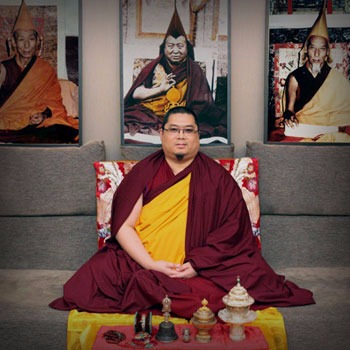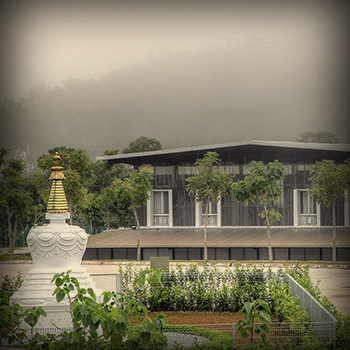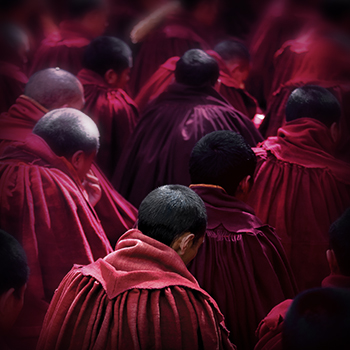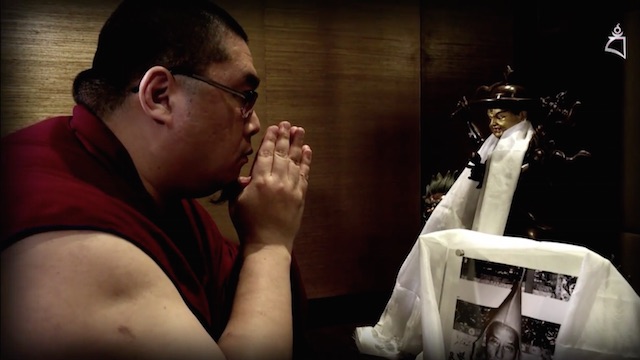catholic , jews and other religions believe that God created the world, the first story of creation, he created the heavens and earth then God said Let there be light and there was light then separated light from darkness etc etc etc .So my question is do Buddhist believe in God .He created everything and every one including Buddhas and Buddha Shakyamuni etc. but I don't hear or see it talking about God. can you help why Tsem Rinpoche don't talk about God maybe im wrong
жЬАеРОпЉМињЩжШѓдЄАдЄ™иЃ©дљ†еРСеЕЛеИЗжЛЙиЃ≤ж≥ХеЄИдїђжЊДжЄЕдљЫж≥ХзЦСйЧЃзЪДж†ПзЫЃгАВеП™йЬАеЬ®дЄЛжЦєеПСеЄГдљ†зЪДйЧЃйҐШпЉМжИСдїђзЪДеЕґдЄ≠дЄАдљНиЃ≤ж≥ХеЄИе∞±дЉЪдЄЇдљ†жПРдЊЫз≠Фж°ИгАВ
ж≥®жДПпЉЪе∞КиіµзЪДи©єжЭЬеЫЇдїБж≥ҐеИЗеНЪеЃҐдЄ≠зЪДињЩдЄАдЄ™ж†ПзЫЃжШѓдЄУдЄЇдљЫж≥ХйЧЃйҐШпЉМжИЦдЄОеЕЛеИЗжЛЙеПКдЉ†жЙњзЫЄеЕ≥зЪДйЧЃйҐШиАМиЃЊгАВиЛ•жИСдїђеПСзО∞дљ†жЙАжПРеЗЇзЪДйЧЃйҐШеЈ≤иґЕеЗЇдї•дЄКиМГеЫіпЉМжИСдїђе∞ЖдЉЪиѓЈдљ†еЬ®еП¶дЄАдЄ™жЫійАВеРИзЪДеє≥еП∞еѓїж±Вз≠Фж°ИгАВж≠§е§ЦпЉМжИСдїђдєЯеїЇиЃЃдљ†еЬ®жПРйЧЃеЙНеЕИжµПиІИдЄАдЇЫжЧІеЄЦпЉИжИЦеЬ®жЬђеНЪеЃҐеЖЕжРЬ糥пЉЙпЉМеЫ†дЄЇдљ†зЪДйЧЃйҐШдєЯиЃЄеЬ®еП¶дЄАзѓЗжЧІеЄЦдЄ≠еЈ≤иҐЂиІ£з≠ФгАВ
What are the differences between the 4 lineages(Nyingma, Sakya, Kagyu, and Gelug) apart from masters? Which one should i join?
How does one find their root guru? I am new to Buddhism and am looking for a guru. What does it require? Any suggestions on who? Also, what are the Shugden views of Namkhai Norbu, Gangchen Rinpoche, Garchen Rinpoche, Lama Tsultrim Allione, Sogyal Rinpoche, Kalu Rinpoche, and Jetsunma Ahkon Lhamo?
What family is Manjushri part of? The Lotus family? Vajra family? Or what exactly?
So far, I've been reading on mendrups and have some questions. If they are made out of holy relics, won't those relics run out? How does one have thousands of mendrup pills of Guru Rinpoche's hair which is quite rare? Or how does one even have millions of mendrup pills of Milarepa's relics?
Also, is there such thing as Dorje Shugden mendrup? Just curious.
Can we do white mahakala practice without initiation
What's the different between Varahi devi in Hinduism and Vajravarahi dakini in Buddhism??? Both are same ??? that claim by some Hindu friends… Need clarification on this matter…tq
So I received a Chod empowerment, but am having questions on this. I still do the practice of Palden Lhamo, but I have read that the dharmapalas will ward off and terrify the local deities, which isn't a good thing in the Chod practice. What am I to do exactly? Do I quit Palden Lhamo for Chod? Or give up Chod for Palden Lhamo? Or is there some sort of solution to this?
I have been diagnosed with stage 3 Lung cancer…is their a healing practice of Dorge Shugden that might address this malady ?
Hello,
What is the translation of OM WAKEY DHA-NE-MA from the White Manjushri Sadhana?
Thanks рЯЩВ
Is Jesus Christ mentioned in Buddhist texts?
I am a substitute teacher who recently accepted a class studying World History Geography and Civilization. In the chapter about India, there is a section entitled "Principles of Buddhism." One sentence in the reading selection states:
"Achieving wisdom is a key step in achieving nirvana or ultimate reality– the end of the self and a reunion with the Great World Soul. "
An item on a test was to be answered: "In Hinduism and Buddhism, respectively, the single force governing the universe was called Brahman and the Great World Soul."
Are these accurate statements? (I am unable to find other references outside the textbook to this concept which a student found doubtful.) How should I clarify or explain the beliefs on this topic?
If you could summarize all buddhist teachings in one simple instruction as a core of all buddhist texts, rituals, mantras…
how would this instruction look like?
Dear Pastor,
Is that a prayer or praise to Vajrayogini that one can do daily without having initiation?
Thank You!
Marcel
Hello,
I am not sure but I may have read somewhere that the White Manjushri sadhana may ameliore the memory. Even if I know it is a samsaric thing(I would still do it even if it does not ameliore the memory) , I would like to know if it is real or not.
Thanks рЯЩВ
Dear pastors,
I have a friend who is sick and upon hearing about Buddhist practices from others he asked me about them because he knows I do some kind of a daily practice.
So I introduced him to Om Mani Padme Hum and 35 Confessional Buddhas practice with the mantra recitation for Om Mani Padme Hum and visualization of Chenrezig and light rays of compassion emanating from Chenrezig to him.
Then for 35 Confessional Buddhas I taught him the recitation of the confessions combined with visualization of each Buddha.
But he says now he tries the visualization and he gets very frustrated. Like it just triggers the frustration when he needs to squeeze his brain. Maybe it is because of the weight of the illness I guess.
So he asked me whether he can just do verbal recitation of Om Mani Padme Hum without worrying about visualization and recitation for 35 Confessional Buddhas without the visualization. He wonders whether there will be zero effect or is it also a good practice?
Thank you for your advice!
What is the difference between a refuge lama and a root guru? Aren't they both the same? If not, who am I supposed to revere highly and practice guru yoga on? Also, does one HAVE to spend 12 years of watching a lama then receive some high tantra empowerment in order for that lama to be my root guru? That's what the Dharmawheel website said, but I have no clue, especially as I took refuge in Lama Kunga Thartse through phone and thought him as my root guru. Could you please clarify?
Hi pastor! i had a bad experience recently. Someone had stolen my wallet from my bag. I had put mantras there and other holy objects including pictures of dzambhala. Im worrying if it will affect me negatively. Im not worrying about the money inside, but the holy objects I have lost. Is it a negative sign for me?
Hello,
I do the Shenresig sadhana to pratice Metta/loving-kindness/compassion. I've asked you about it a long time ago and you told me it is possible to send(or imagine sending) that Metta that come to us from Shenresig to all beings, but what visualisation/pratice exactly to do for that?
Thanks!
Hello,
May I post my queries in Chinese, as my Buddhism practicing is under Mandarin, and I don't know about the correct words and terms of certain Buddhism in English.
Thank you.
Tashi Delek.
иѓЈжФѓжМБжИСдїђпЉМе•љиЃ©жИСдїђиГљзїІзї≠дЄЇдљ†еЄ¶жЭ•жЫіе§ЪдљЫж≥ХпЉЪ
иѓЈзХЩжДПпЉМиЛ•дљ†иЇЂеЬ®зЊОеЫљпЉМдљ†жЙАдљЬзЪДдЊЫеЕїеТМиі°зМЃеЭЗеПѓдЇЂжЬЙеЕНз®ОдЉШжГ†гАВпљЮtsemrinpoche.comеНЪеЃҐе∞ПзїД
дЉЪиІБиЃ≤ж≥ХеЄИдїђ

дЄЇз§ЊеМЇжЬНеК°пЉМдїОдЄНи®АеА¶
еЕЈжЬЙеЬ®еЃґдЇЇзЪДе§Ци°®пЉМеНіиГМиіЯеЗЇеЃґдЇЇзЪДиі£дїїпЉМиЃ≤ж≥ХеЄИиЗ™зДґиАМзДґе∞±жЙЃжЉФдЇЖеГІдЉљеТМдЄАиИђдњЃи°МиАЕдєЛйЧізЪДж°•жҐБгАВдїЦдїђжШѓиЈЯдљ†жИСдЄАж†ЈзЪДеЗ°дЇЇпЉМеНіиЈ®еЗЇдЇЖйЭЮеЗ°зЪДдЄАж≠•пЉМе∞ЖдЄАзФЯзФ®жЭ•еЉШжЙђдљЫж≥ХгАВдљЬдЄЇжМБжИТзЪДеЬ®еЃґдЇЇпЉМиЃ≤ж≥ХеЄИиЃ©жЫіе§ЪдЇЇжЬЙжЬЇдЉЪжО•иІ¶дљЫж≥ХпЉМдЄЇдЇЇдїђжПРдЊЫжМЗеѓЉеТМзЯ•иѓЖгАВиЃ≤ж≥ХеЄИдїђйАЪеЄЄдЉЪй©їеЃИеЕЛеИЗжЛЙдљЫжХЩдЄ≠ењГпЉМйЪПжЧґеЗЖе§ЗдЄЇдЇЇдїђињЫи°МиЊЕеѓЉгАВжђ≤зЯ•иѓ¶жГЕпЉМиѓЈиБФз≥ї house@kechara.comгАВ
и∞ҐжЭЊеє≥иЃ≤ж≥ХеЄИпЉИеН≥е∞ЖеЗЇеЃґпЉЙ

дљЬдЄЇиЃ≤ж≥ХеЄИпЉМи∞ҐжЭЊеє≥дЄїи¶БжШѓйАПињЗж≥ХдЉЪгАБдї™еЉПгАБиЊЕеѓЉеТМеИЖдЇЂдљЫж≥ХзЯ•иѓЖпЉМе∞Жж≠§зФЯзФ®еЬ®еНПеК©и©єжЭЬеЫЇдїБж≥ҐеИЗеЉШж≥ХеИ©зФЯзЪДдЇЛдЄЪдЄКгАВ
и∞ҐжЭЊеє≥дЇО2011庳襀жОИдїїдЄЇиЃ≤ж≥ХеЄИпЉМдїЦзЪДдљЫж≥ХдЇЛдЄЪжЧҐдЄ∞еѓМеПИе§ЪеЕГпЉМжЧҐжЫЊеЬ®еЕЛеИЗжЛЙ姩е†ВжЦЗзЙ©дЄ≠ењГжЛЕдїїињЗдЄЊиґ≥иљїйЗНзЪДиБМеК°пЉМдєЯжЫЊжШѓе∞КиіµзЪДи©єжЭЬеЫЇдїБж≥ҐеИЗзЪДзІБдЇЇеК©зРЖпЉМдЄНдїЕеИ∞ињЗдЄНеРМеЬ£еЬ∞жЬЭеЬ£пЉМдєЯжО•еПЧињЗе§Ъй°єйЂШзЇІзСЬдЉљеѓЖзї≠зБМй°ґгАВдїЦзЖЯжВЙе§ЪзІНж≥ХдЉЪдї™еЉПпЉМеѓєдљЫж≥ХдєЯжЬЙжЈ±еЕ•зЪДзРЖиІ£гАВ
дљЬдЄЇиЃ≤ж≥ХеЄИпЉМи∞ҐжЭЊеє≥дЄїи¶БжШѓйАПињЗж≥ХдЉЪгАБдї™еЉПгАБиЊЕеѓЉеТМеИЖдЇЂдљЫж≥ХзЯ•иѓЖпЉМе∞Жж≠§зФЯзФ®еЬ®еНПеК©и©єжЭЬеЫЇдїБж≥ҐеИЗеЉШж≥ХеИ©зФЯзЪДдЇЛдЄЪдЄКгАВ
ељУи∞ҐжЭЊеє≥зђђдЄАжђ°йБЗиІБи©єжЭЬеЫЇдїБж≥ҐеИЗжЧґпЉМдїБж≥ҐеИЗе∞±йЧЃдїЦжШѓеР¶жДњжДПеЗЇеЃґдЄЇеГІгАВиЩљзДґйВ£жШѓи∞ҐжЭЊеє≥зЪДењГжДњпЉМдЄНињЗељУжЧґзЪДдїЦињШжШѓеСКиѓЙдїБж≥ҐеИЗпЉМиЗ™еЈ±жЙУзЃЧињЯдЄАдЇЫеЖНеЗЇеЃґгАВеѓєи∞ҐжЭЊеє≥жЭ•иѓіпЉМжЬђиЇЂжЧҐзДґеЈ≤зїПжШѓеЕ®иБМдљЫж≥ХеЈ•дљЬиАЕпЉМеЗЇеЃґе∞ЖдЉЪжШѓжЬАе•љзЪДдЇЛгАВдїБж≥ҐеИЗдЄНжЧґйГљдЉЪжПРйЖТи∞ҐжЭЊеє≥дЄЇеЗЇеЃґеБЪеЗЖе§ЗпЉМиАМдїЦдєЯз≠ФеЇФиЗ™еЈ±жЬ™жЭ•е∞ЖдЉЪеЗЇеЃґгАВ
еЕЛеИЗжЛЙдїОйЫґеЉАеІЛеПСе±ХиЗ≥дїКжЧ•зЪДеЕЛеИЗжЛЙз¶ЕдњЃжЮЧињЩдєИе§ІиІДж®°зЪДиЃ°еИТвАФвАФи∞ҐжЭЊеє≥иІЙеЊЧпЉМзЫЃеЙНж≠£жШѓдїЦеЗЇеЃґзЪДжЬАдљ≥жЧґеИїгАВдЇОжШѓељУдїБж≥ҐеИЗеЖНжђ°йЧЃиµЈдїЦеЗЇеЃґзЪДжЙУзЃЧжЧґпЉМдїЦе∞±дЄАеП£з≠ФеЇФдЇЖгАВ
йВЭдїБзИ±иЃ≤ж≥ХеЄИпЉИеН≥е∞ЖеЗЇеЃґпЉЙ

JдїБзИ±еЄМжЬЫжИРдЄЇдЉ†жЙњеЃЧеЦАеЈіе§ІеЄИж≥ХжХЩзЪДе™ТдїЛпЉМеИ©зЫКеєіиљїдЄЛдЄАдї£пЉЫеєґдЄФеРѓеПСжЫіе§ЪдЇЇжККдљЫйЩАзЪДжХЩиѓ≤еЃЮиЈµеЬ®зФЯжіїйЗМгАВ
зФ±дЇОйВЭдїБзИ±зЪДзИґжѓНдЇ≤еЊИе§ЪеєіеЙНе∞±еЉАеІЛиЈЯеЕЛеИЗжЛЙжЬЙеЊИжЈ±зЪДжО•иІ¶пЉМжЙАдї•е•єеєіеєЉжЧґжЬЯе∞±йБЗиІБдЇЖе∞КиіµзЪДи©єжЭЬеЫЇдїБж≥ҐеИЗгАВж≤°жЬЙдїБж≥ҐеИЗзЪДжЧ•е≠РпЉМеѓєе•єжЭ•иѓіжШѓйЪЊдЇОжГ≥и±°зЪДгАВдїБзИ±иЗ™е∞Пе∞±еЬ®и©єжЛЙзЂ†ељУењЧеЈ•гАВеЬ®иАГиОЈиЛ±еЫљдЉ¶жХ¶ж≤ГйЗМеЕЛе§Іе≠¶ењГзРЖе≠¶е≠¶е£ЂеРОпЉМе•єеЬ®дЉ¶жХ¶зЉУеИСзЃ°зРЖе±АеЈ•дљЬгАВдєЛеРОеЫЮеИ∞й©ђжЭ•и•њдЇЪеК†еЕ•E йГ®йЧ®пЉМиіЯиі£зЃ°зРЖkechara.comзЪДжѓПеС® Kechara зФµе≠РжЦ∞йЧїпЉМеЈ•дљЬеЖЕеЃєеМЕжЛђжТ∞з®њеТМеЃ°з®њгАВиЊГеРОпЉМе•єеК†еЕ•дїБж≥ҐеИЗзЪДеЖЩдљЬе∞ПзїДпЉМиіЯиі£жЙІи°МдїБж≥ҐеИЗзЪДжМЗз§ЇпЉМдї•еПКзЃ°зРЖдїБж≥ҐеИЗзЪДеЊАжЭ•дњ°дїґгАВ
еЬ®2004еєіеПВиЃњеН∞еЇ¶зЪДдЄАеЃґеГІе∞ЉеЇµдєЛеРОпЉМдїБзИ±иѓіпЉМе•єињШиЃ∞еЊЧељУжЧґзЬЛиІБйЗМйЭҐзЪДжѓПдЄ™дЇЇйГљжіЛжЇҐзЭАењЂдєРзЪДзђСиДЄпЉМе§ІеЃґзЪДзФЯжіїйГљеЊИжЬЙзЫЃж†ЗгАВе•єдєЯжДЯиІЙеЊИзЖЯжВЙпЉМзЬЛеЬ®е•єзЬЉйЗМпЉМеГІиҐНжШѓе¶Вж≠§зЪДиИТжЬНеТМиЗ™еЬ®гАВеЬ®еЊБ胥дЇЖжѓНдЇ≤зЪДжДПиІБеРОпЉМдїБзИ±зЂЛеН≥зїЩдїБж≥ҐеИЗеПСзЯ≠дњ°еСКиѓЙдїЦиЗ™еЈ±жГ≥и¶БеЗЇеЃґзЪДењµе§ігАВељУжЧґдїБж≥ҐеИЗеКЭеСКе•єењЕй°їеЕИеЃМжИРе§Іе≠¶е≠¶дЄЪпЉМе¶Вж≠§дЄАжЭ•пЉМељУе•єиЃ≤ж≥ХжЧґпЉМдЄАи®АдЄАиѓ≠жЙНиГљжЬЙеКЫйЗПеТМжЈ±еЇ¶гАВе•єжШѓеЬ®е∞ЖжЭ•и¶БеЗЇеЃґдЄЇеГІе∞ЉзЪДжО®еК®еКЫдЄЛеЃМжИРе§Іе≠¶е≠¶дЄЪгАВ
дїБзИ±еЄМжЬЫйАПињЗеЗЇеЃґдЄЇеГІе∞ЉпЉМжККиЗ™еЈ±ељУжИРдЉ†жЙњеЃЧеЦАеЈіе§ІеЄИж≥ХжХЩзЪДе™ТдїЛпЉМеИ©зЫКеєіиљїдЄЛдЄАдї£пЉЫеєґдЄФеРѓеПСжЫіе§ЪдЇЇжККдљЫйЩАзЪДжХЩиѓ≤еЃЮиЈµеЬ®зФЯжіїйЗМгАВе•єеЄМжЬЫйАЪињЗињЩж†ЈзЪДжЦєеЉПжЭ•еЫЮжК•зИґжѓНдЇ≤еТМдЄКеЄИзЪДжБ©жГ†гАВж≠§е§ЦпЉМе•єдєЯеЄМжЬЫиЗ™еЈ±еТМеИЂдЇЇйГљиГљеРМжЧґз¶їиЛ¶еЊЧдєРгАВ
йЩИз®ЪйСЂиЃ≤ж≥ХеЄИпЉИеН≥е∞ЖеЗЇеЃґпЉЙ

еѓєз®ЪйСЂиАМи®АпЉМдЄЛеЃЪеЖ≥ењГеК™еКЫеИ©зЫКдЉЧзФЯеПКйАЪињЗеИЖдЇЂдљЫж≥ХжЭ•еЫЮжК•дїЦдЇЇжБ©жГ†пЉМжШѓе•єжЙАиЈ®еЗЇзЪДдЄАе§Іж≠•гАВ
еЬ®еК†еЕ•еЕЛеИЗжЛЙдєЛеЙНпЉМйЩИз®ЪйСЂжШѓдЄАеРНиЃ≤еЄИгАБиѓЊз®ЛеЖЕеЃєзЉЦеЖЩеСШпЉМеРМжЧґдєЯиіЯиі£зЉЦеЖЩзФµе≠Ре≠¶дє†жЦєж°ИгАВеЬ®иіЯиі£зїЩеРДе§Іе≠¶йЩҐжХЩиБМдЇЇеСШеЗЖе§ЗвАЬзЙєжЃКзФ®йАФиЛ±иѓ≠вАЭпЉИESPпЉЙиЃ≠зїГиѓЊз®ЛзЪДељУеДњпЉМе•єеПЧйВАеЗЇеЄ≠е∞КиіµзЪДи©єжЭЬеЫЇдїБж≥ҐеИЗзЪДеЉАз§ЇгАВињЩеЬЇеЉАз§ЇйЗНжЦ∞зВєзЗГе•єеѓєиЧПдЉ†дљЫжХЩзЪДеЕіиґ£пЉМеФ§иµЈе•єеєіе∞СжЧґзїПеЄЄиЈЯзИґжѓНеЗЇеЄ≠дљЫж≥ХеЉАз§ЇзЪДзЊОе•љеЫЮењЖгАВ
2006еєіпЉМйЩИз®ЪйСЂеК†еЕ•еЕЛеИЗжЛЙе™ТдљУеЗЇзЙИз§ЊпЉМжИРдЄЇеЕ®иБМзЪДеЄВеЬЇжЙІи°МеСШпЉМиіЯиі£жККдїБж≥ҐеИЗзЪДжХЩиѓ≤жО®еєњеИ∞дЄЦзХМеРДиІТиРљгАВе¶ВдїКпЉМз®ЪйСЂжШѓи©єжЛЙзЂ†зЪДдЄАеСШпЉМиіЯиі£зЕІй°ЊдїБж≥ҐеИЗзЪДдЄЦдњЧдЇЛеК°пЉМиЃ©дїБж≥ҐеИЗдЄУж≥®дЇОеЉШж≥ХеИ©зФЯеЈ•дљЬгАВ
з®ЪйСЂиѓіпЉМељУе•єеЖ≥еЃЪеК†еЕ•еЕЛеИЗжЛЙељУеЕ®иБМиБМеЈ•жЧґпЉМе∞±и™Уи®Аи¶БжККж≠§зФЯзФ®еЬ®еБЪдЄАдЇЫеИ©зЫКдЉЧзФЯзЪДдЇЛгАВзФ±дЇОеЬ®дїБж≥ҐеИЗиЇЂиЊєдЊНе•ЙпЉМе•єдЇ≤иІБдЄКеЄИеН≥дљњйЭҐеѓєе§ЪиЙ∞еЈ®зЪДжМСжИШпЉМйГљдЄНжЫЊи®АеА¶еЬ∞еНПеК©еИЂдЇЇпЉМеЉШжЙђзФШдЄєеѓЇзЪДдЉ†жЙњдљЫж≥ХпЉЫињЩиЃ©е•єжШОдЇЖеЗЇеЃґдЄЇе∞ЉжШѓе•єзЪДдЄЛдЄАж≠•пЉМе¶Вж≠§жЙНиГљеИЫйА†еРСдЄКеЄИе≠¶дє†дљЫж≥ХзЪДжЭ°дїґгАВињЩдєЯжШѓз®ЪйСЂеК™еКЫеИ©зЫКдЉЧзФЯеПКйАЪињЗеИЖдЇЂдљЫж≥ХеЫЮжК•дїЦдЇЇжБ©жГ†пЉМжЙАиЈ®еЗЇзЪДдЄАе§Іж≠•гАВ
жЄ©е©Йе¶ВиЃ≤ж≥ХеЄИпЉИеН≥е∞ЖеЗЇеЃґпЉЙ

иЗ™дїОеЬ®еЕЛеИЗжЛЙжЙЊеИ∞дЇЖиЗ™еЈ±зЪДењГзБµељТеЃњеРОпЉМе©Йе¶Ве∞±жККдљЫж≥ХдЇЛдЄЪдљЬдЄЇе•єдЇЇзФЯзЪДдљњеСљпЉМеєґеЄМжЬЫе∞ЖдЄАзФЯйГљзФ®жЭ•еЉШж≥ХеИ©зФЯгАВ
е©Йе¶ВеЬ®2010еєіеЇХжЧ†жДПдЄ≠еПСзО∞дЇЖи©єжЭЬеЫЇдїБж≥ҐеИЗзЪДеНЪеЃҐпЉМдєЛеРОе∞±дЄАзЫіиЈЯйЪПдїБж≥ҐеИЗзЪДеНЪеЃҐеТМйЭҐе≠Рдє¶гАВеЬ®2012еєі7жЬИиЗ™еП∞жєЊж≥ХйЉУжЦЗзРЖе≠¶йЩҐиАГиОЈдљЫжХЩе≠¶з≥їжЦЗе≠¶з°Хе£Ђе≠¶дљНеРОпЉМе©Йе¶Ве∞±еЫЮеИ∞й©ђжЭ•и•њдЇЪеК†еЕ•еЕЛеИЗжЛЙжИРдЄЇиµДжЈ±жХЩиВ≤жЙІи°МеСШгАВе©Йе¶ВжЈ±еПЧдїБж≥ҐеИЗиѓіж≥ХжЧґзЪДзЫізОЗй£Ож†ЉжЙАеРЄеЉХпЉМдєЯжГКеПєдЇОеЕЛеИЗжЛЙеЬ®дїБж≥ҐеИЗзЪДйҐЖеѓЉдЄЛжЙАеПЦеЊЧзЪДеПСе±ХжИРзї©гАВеѓєе•єиАМи®АпЉМдїБж≥ҐеИЗжШѓдЄАдљНи®Аи°МдЄАиЗігАБи®АеЗЇењЕи°МгАБзЬЯењГеЕ≥жААдїЦдЇЇзЪДе§ІеЄИгАВдїЦжЧ†зЦСжШѓдЄКеЄИдЊЭж≠ҐењГзЪДжЬАдљ≥ж¶Ьж†ЈпЉМињЩдєЯжШѓе©Йе¶ВдЄАењГи¶БеЬ®иЗ™еЈ±ењГйЗМзФЯиµЈзЪДзЊОе•љзЙєиі®гАВ
иЗ™дїОеЬ®еЕЛеИЗжЛЙжЙЊеИ∞дЇЖиЗ™еЈ±зЪДењГзБµељТеЃњеРОпЉМе©Йе¶Ве∞±жККдљЫж≥ХдЇЛдЄЪдљЬдЄЇе•єдЇЇзФЯзЪДдљњеСљгАВ2013еєі5жЬИпЉМе•єж≠£еЉПиѓЈж±ВдїБж≥ҐеИЗжОИдЇИе•єеЗЇеЃґжИТпЉМе•єеЄМжЬЫйАЪињЗеЗЇеЃґе∞ЖзФЯеСљеЃМеЕ®е•ЙзМЃеЬ®еЉШж≥ХеИ©зФЯдЄКгАВе©Йе¶ВиѓіпЉМеЗЇеЃґжДПеС≥зЭАиЗ™еЈ±зЬЯиѓЪеЫЮеЇФеЖЕеЬ®зЪДеСЉеФ§пЉМеН≥е∞ЖдљЫж≥ХиіѓељїдЇОзФЯжіїеПКйА†з¶ПдїЦдЇЇгАВ
TињЩдЄ™зЫЃж†ЗеФѓжЬЙеЬ®йБЗиІБж†єжЬђдЄКеЄИеєґеРСдїЦе≠¶дє†еРОжЙНеПѓиГљиЊЊеИ∞пЉЫе©Йе¶ВеЊИеєЄињРзЪДйБЗиІБдЇЖиЗ™еЈ±зЪДж†єжЬђдЄКеЄИвАФвАФе∞КиіµзЪДи©єжЭЬеЫЇдїБж≥ҐеИЗгАВ
е∞ЉжЛЙиЃ≤ж≥ХеЄИпЉИеН≥е∞ЖеЗЇеЃґпЉЙ

е∞ЉжЛЙиѓЈж±ВеЗЇеЃґеПЧжИТпЉМдЄАжЦєйЭҐжШѓдЄЇдЇЖжПРеНЗиЗ™еЈ±пЉМеП¶дЄАжЦєйЭҐдєЯеЄМжЬЫиГљйАПињЗе≠¶дє†дЉ†жЙњж≥ХжХЩпЉМе∞ЖзЇѓеЗАзЪДжХЩиѓ≤еїґзї≠еИ∞дЄЛдЄАдї£гАВдїЦеПСжДњи¶БеГПдЄКеЄИи©єжЭЬеЫЇдїБж≥ҐеИЗеИ©зЫКдїЦйВ£ж†ЈжЭ•йА†з¶ПеЕґдїЦдЇЇгАВ
е∞ЉжЛЙеЬ®иЛ±еЫљеЗЇзФЯеТМйХње§ІпЉМе§Іе≠¶жЧґжЬЯдЄїдњЃдЇЇз±їе≠¶гАВжѓХдЄЪдєЛеРОпЉМдїЦжЫЊеЕИеРОеЬ®дЄАеЃґйЕТеЇЧеЉПеЕђеѓУеПКжЧЕй¶ЖеЕђеПЄеПКдЄАеЃґзЃ°зРЖеЕђеПЄжЛЕ俿賥еК°зЃ°зРЖеСШгАВеЬ®дЄАдЄ™еБґзДґзЪДжЬЇзЉШдЄЛпЉМдїЦеЬ®зљСзїЬдЄКеПСзО∞дЇЖе∞КиіµзЪДи©єжЭЬеЫЇдїБж≥ҐеИЗзЪД Youtube йҐСйБУгАВж≠£жШѓйАПињЗдїБж≥ҐеИЗзЪДжХЩиѓ≤пЉМе∞ЉжЛЙеЉАеІЛжШОзЩље¶ВжЮЬжГ≥и¶БиЗ™еИ©еИ©дїЦпЉМжЬАйЗНи¶БзЪДе∞±жШѓи¶БдњЃдє†дљЫж≥ХгАВ
еЬ®зљСзїЬдЄКдЄОдїБж≥ҐеИЗвАЬзїУзЉШвАЭдєЛеРОпЉМе∞ЉжЛЙдЄАзЫійГљдЄОи©єжЭЬеЫЇдїБж≥ҐеИЗеЕґдЄ≠дЄАдљНеЬ®иЛ±еЫљзЪДеЉЯе≠РдњЭжМБиБФз≥їгАВеЬ®еРОиАЕзЪДйЉУеК±дЄЛпЉМдїЦдЇО2012еєіеЇХдЄУз®ЛеЙНжЭ•й©ђжЭ•и•њдЇЪеЕЛеИЗжЛЙдљЫжХЩдЄ≠ењГињЫи°МеНБ姩зЪДиЃњйЧЃеТМе≠¶дє†гАВз¶їеЉАеЙНпЉМи©єжЭЬеЫЇдїБж≥ҐеИЗи¶Бж±Ве∞ЉжЛЙеК†еЕ•еЕЛеИЗжЛЙдљЫжХЩеЫҐдљУгАВе∞ЉжЛЙжѓЕзДґз≠ФеЇФдЇЖгАВ
2013еєі2жЬИпЉМе∞ЉжЛЙз¶їеЉАиЛ±еЫљињБзІїеИ∞й©ђжЭ•и•њдЇЪпЉМеЉАеІЛеЬ®еЕЛеИЗжЛЙдљЫжХЩдЄ≠ењГжЛЕдїїжХЩиВ≤еНПи∞ГеСШдЄАиБМпЉМеНПеК©жХЩиВ≤е∞ПзїДзЉЦжОТеТМеЃЮжЦљжЦ∞иѓЊз®ЛзЇ≤и¶БпЉМеРМжЧґдєЯеПВдЄОеЕЛеИЗжЛЙеС®жЧ•еДњзЂ•дљЫж≥ХзП≠зЪДжОИиѓЊеЈ•дљЬгАВиЗ™йБЗиІБи©єжЭЬеЫЇдїБж≥ҐеИЗдї•жЭ•пЉМдїБж≥ҐеИЗдЄНжЦ≠йЉУеК±дїЦе§ЪдїОдЇЛдљЫж≥ХдЇЛдЄЪпЉМеК™еКЫжФєињЫиЗ™еЈ±гАВе∞ЉжЛЙдєЯе∞ЖдїБж≥ҐеИЗзЪДеПЃеШ±йУ≠иЃ∞дЇОењГпЉМж≠£еЫ†е¶Вж≠§пЉМдїЦеЖ≥еЃЪеРСи©єжЭЬеЫЇдїБж≥ҐеИЗжПРеЗЇеЗЇеЃґзЪДиѓЈж±ВгАВ
е∞ЉжЛЙиѓЈж±ВеЗЇеЃґеПЧжИТпЉМдЄАжЦєйЭҐжШѓдЄЇдЇЖжПРеНЗиЗ™еЈ±пЉМеП¶дЄАжЦєйЭҐдєЯеЄМжЬЫиГљйАПињЗе≠¶дє†дЉ†жЙњж≥ХжХЩпЉМе∞ЖзЇѓеЗАзЪДжХЩиѓ≤еїґзї≠еИ∞дЄЛдЄАдї£гАВдїЦеПСжДњи¶БеГПдЄКеЄИи©єжЭЬеЫЇдїБж≥ҐеИЗеИ©зЫКдїЦйВ£ж†ЈжЭ•йА†з¶ПеЕґдїЦдЇЇгАВ
йЩИйФ¶дЄљиЃ≤ж≥ХеЄИпЉИеН≥е∞ЖеЗЇеЃґпЉЙ

йФ¶дЄљдЄУж≥®дЇОйАПињЗдљЫж≥ХеИЖдЇЂгАБиЊЕеѓЉгАБж≥ХдЉЪеТМеЕґдїЦдљЫжХЩжЬНеК°пЉМзїЩжѓПдЄАдЄ™иµ∞еЕ•еЕЛеИЗжЛЙзЪДдЇЇжМЗеЉХеТМеЄЃеК©гАВе•єеЄМжЬЫиГљиЧЙзФ±еНПеК©еЉШжЙђеЃЧеЦАеЈіе§ІеЄИзЪДжЃКиГЬж≥ХжХЩеПКеРѓеПСеИЂдЇЇиЄПдЄКзБµдњЃдєЛиЈѓжЭ•жК•з≠ФдЄКеЄИзЪДжБ©жГ†гАВињЩдєЯжШѓдЇ≤зИ±зЪДдЄКеЄИдЄАзЫідї•жЭ•еѓєе•єзЪДеКЭеСКгАВ
йФ¶дЄљеЬ®2006еєіиЈЯеПЛдЇЇеЙНеЊАйЗСеПМе®БзФ®й§РжЧґеПСзО∞дЇЖеЕЛеИЗжЛЙдљЫжХЩдЄ≠ењГпЉМдєЛеРОзЂЛеН≥еПВдЄОдЇЖеЕЛеИЗжЛЙдЄїеКЮзЪДжіїеК®гАВе•єжЫіиЄКиЈГеПВдЄОдЇЖељУжЧґзЪДдЄАеНГдЄЗгАКзЉШжВ≤зїПгАЛењµиѓµйЧ≠еЕ≥гАВ 2006еєі4жЬИпЉМйФ¶дЄљйБЗиІБдЇЖе∞КиіµзЪДи©єжЭЬеЫЇдїБж≥ҐеИЗпЉМдєЯзђђдЄАжђ°еЗЇеЄ≠дЇЖдїБж≥ҐеИЗзЪДеЉАз§ЇпЉМйВ£жђ°зЪДеЉАз§ЇиЃ©йФ¶дЄљз¶БдЄНж≠ҐжµБж≥™гАВељУжЧґзЪДе•єеєґдЄНжШОзЩљиЗ™еЈ±еУ≠ж≥£зЪДеОЯеЫ†пЉМзЫіеИ∞еРОжЭ•е•єжЙНжШОзЩљйВ£жШѓеЫ†дЄЇиЗ™еЈ±зїИдЇОжЙЊеИ∞дЇЖеЃМзЊОзЪДдЄКеЄИпЉМиАМдїБж≥ҐеИЗжЕИжВ≤еЬ∞дї•иЇЂз§ЇжХЩзЪДеЉШж≥ХжЦєеЉПжЫіжШѓжЈ±жЈ±жДЯеК®дЇЖе•єгАВ
йФ¶дЄљеЬ®2009еєіеК†еЕ•еЕЛеИЗжЛЙдљЫжХЩдЄ≠ењГжИРдЄЇеЕ®иБМиБМеЈ•пЉМиіЯиі£еЖЕйГ®дЇЛеК°гАВзЫЃеЙНпЉМе•єжШѓеЕЛеИЗжЛЙдљЫжХЩдЄ≠ењГеЕґдЄ≠дЄАдљНеЙНеП∞жЬНеК°зїПзРЖпЉМдЄїи¶Бй©їжіЊеЬ®ељ≠дЇ®жЦЗеЖђзЪДз¶ЕдњЃжЮЧгАВж≠§е§ЦпЉМе•єдєЯеЬ®жШЯжЬЯ姩зЪДдљЫж≥ХзП≠жОИиѓЊпЉМеєґзїПеЄЄдљЬдЄЇи©єжЭЬеЫЇдїБж≥ҐеИЗеНЪеЃҐиБК姩偧зЪДеНПи∞ГеСШгАВ
дїБж≥ҐеИЗзЪДиЃЄе§ЪжХЩиѓ≤жФєеПШдЇЖе•єзФЯеСљйЗМзЪДиљїйЗНзЉУжА•гАВе•єеЬ®дљЫж≥ХдЄ≠жЙЊеИ∞дЇЖзФЯеСљзЪДзЫЃж†ЗпЉМдєЯжДПиѓЖеИ∞еП™жЬЙиЈЯйЪПдљЫйЩАзЪДжЕИжВ≤еТМжЩЇжЕІдєЛйБУпЉМжЙНжШѓеЕЛжЬНзЧЫиЛ¶еТМжД§жАТзЪДжЦєж≥ХгАВ ињЩдЄ™йҐЖжВЯиЃ©е•єжПРеЗЇдЇЖеЗЇеЃґзЪДиѓЈж±ВгАВ
йФ¶дЄљзЫЃеЙНжШѓдЄАдљНдљЫжХЩиЃ≤ж≥ХеЄИпЉМе∞ЖжЭ•дЉЪеЗЇеЃґдЄЇеГІе∞ЉгАВе•єе∞ЖдЄУж≥®дЇОйАПињЗдљЫж≥ХеИЖдЇЂгАБиЊЕеѓЉгАБж≥ХдЉЪеТМеЕґдїЦдљЫжХЩжЬНеК°пЉМзїЩжѓПдЄАдЄ™иµ∞еЕ•еЕЛеИЗжЛЙзЪДдЇЇжМЗеЉХеТМеЄЃеК©гАВе•єеЄМжЬЫиГљиЧЙзФ±еНПеК©еЉШжЙђеЃЧеЦАеЈіе§ІеЄИзЪДжЃКиГЬж≥ХжХЩеПКеРѓеПСеИЂдЇЇиЄПдЄКзБµдњЃдєЛиЈѓжЭ•жК•з≠ФдЄКеЄИзЪДжБ©жГ†гАВ
зљЧиГЬељ™иЃ≤ж≥ХеЄИпЉИеН≥е∞ЖеЗЇеЃґпЉЙ

зљЧиГЬељ™еЖ≥ењГеНПеК©дїБж≥ҐеИЗеЉШжЙђдљЫж≥ХпЉМеЄ¶зЭАињЩдЄ™еЭЪеЃЪзЪДеЖ≥ењГпЉМзљЧиГЬељ™жФЊеЉГеИ∞еЙСж°•е§Іе≠¶зїІзї≠з†ФиѓїеНЪе£Ђе≠¶дљНпЉИдїЦељУжЧґеЈ≤иОЈељХеПЦпЉЙзЪДжЬЇдЉЪпЉМдєЯиЊЮеОїдЇЖз†Фз©ґеЈ•дљЬпЉМеЕ®иБМеНПеК©дїБж≥ҐеИЗдїОдЇЛдљЫж≥ХдЇЛдЄЪпЉМиЗ≥дїКдїОдЄНи®АжВФгАВ
зљЧиГЬељ™дЇО2001еєіеИЭйБЗе∞КиіµзЪДи©єжЭЬеЫЇдїБж≥ҐеИЗжЧґпЉМеєґж≤°жГ≥ињЗиЗ™еЈ±дЉЪеЕ®ењГеЕ®жДПжКХеЕ•дљЫж≥ХдЇЛдЄЪгАВйВ£дЄАеєіпЉМеЈ•з®Лз≥їз°Хе£Ђе≠¶дљНжѓХдЄЪзЪДдїЦж≠£еЬ®жЦ∞еК†еЭ°дїОдЇЛеЈ•з®Лз†Фз©ґеЈ•дљЬгАВзДґиАМпЉМдїБж≥ҐеИЗзЪДеЉАз§ЇиЃ©дїЦзХЩдЄЛйЭЮеЄЄжЈ±еИїзЪДеН∞и±°гАВиЈЯдїБж≥ҐеИЗжЬЙињЗеЗ†жђ°жО•иІ¶дєЛеРОпЉМзљЧиГЬељ™еЉАеІЛдЄЇдїБж≥ҐеИЗеТМеЕЛеИЗжЛЙжЮґиЃЊзљСзЂЩгАВ
зљЧиГЬељ™иЩљжШѓзРЖзІСзП≠еЗЇзФЯпЉМеНіжЈ±жДЯдЇЇзФЯжЬЙиЃЄе§ЪзЦСйЧЃжШѓзІСе≠¶жЧ†ж≥ХеЬЖжї°иІ£з≠ФзЪДгАВдЄОж≠§еРМжЧґпЉМдїЦдєЯеПСзО∞дїїеЗ≠зІСе≠¶жКАжЬѓеЖНжАОдєИеПСиЊЊпЉМдєЯдЄНиГљзЬЯж≠£иІ£еЖ≥дЇЇз±їжЙАйЭҐеѓєзЪДйЪЊйҐШпЉМеЫ†дЄЇдїК姩зІСжКАеПСиЊЊпЉМзФЯжіїж∞іеЗЖжѓФиµЈеЗ†еНГеєіеЙНйЂШеЗЇиЃЄе§ЪпЉМдљЖжШѓдЇЇз±їдїНзДґйЭҐеѓєзЭАеРМж†ЈзЪДйЧЃйҐШпЉМжИСдїђдєЯдЄНиІБеЊЧињЗеЊЧжѓФеП§дЇЇеєЄз¶ПењЂдєРгАВ
еЬ®жО•иІ¶дїБж≥ҐеИЗдєЛеРОпЉМзљЧиГЬељ™еЊИењЂе∞±жДПиѓЖеИ∞дљЫж≥ХжШѓиІ£еЖ≥ињЩдЇЫйЧЃйҐШзЪДз©ґзЂЯжЦєж°ИпЉМиАМдїБж≥ҐеИЗйЗЗзФ®зЪДжЦєж≥ХдєЯйЭЮеЄЄйАВеРИзО∞дї£з§ЊдЉЪгАВеЫ†ж≠§пЉМзљЧиГЬељ™еЖ≥ењГеНПеК©дїБж≥ҐеИЗеЉШжЙђдљЫж≥ХпЉМеЄ¶зЭАињЩдЄ™еЭЪеЃЪзЪДеЖ≥ењГпЉМзљЧиГЬељ™жФЊеЉГеИ∞еЙСж°•е§Іе≠¶зїІзї≠з†ФиѓїеНЪе£Ђе≠¶дљНпЉИдїЦељУжЧґеЈ≤иОЈељХеПЦпЉЙзЪДжЬЇдЉЪпЉМдєЯиЊЮеОїдЇЖз†Фз©ґеЈ•дљЬпЉМеЕ®иБМеНПеК©дїБж≥ҐеИЗдїОдЇЛдљЫж≥ХдЇЛдЄЪпЉМиЗ≥дїКдїОдЄНи®АжВФгАВ
еѓєзљЧиГЬељ™иАМи®АпЉМйБЗиІБдїБж≥ҐеИЗжШѓдЄ™еЕ®жЦ∞зЪДдЇЇзФЯзїПеОЖгАВдїБж≥ҐеИЗиЃ©дїЦзЬЛеИ∞дЇЖдљЫж≥ХеПѓдї•еЬ®иЈ≥еЗЇдЉ†зїЯж°ЖжЮґзЪДеРМжЧґпЉМдЊЭзДґдњЭзХЩеЕґз≤ЊйЂУгАВеЫ†дЄЇиЇЂдЄЇдїБж≥ҐеИЗзЪДзІБдЇЇеК©зРЖпЉМзљЧиГЬељ™жЬЙињЗиЃЄе§ЪдЄНеПѓжАЭиЃЃзЪДзїПеОЖгАВдїЦиЗ™иЃ§йЭЮеЄЄеєЄињРпЉМиГљдЇ≤зЬЉиІБиѓБдїБж≥ҐеИЗжЧ†иЃЇеЬ®ж≥ХеЇІдЄКжИЦзФЯжіїдЄ≠пЉМйГљжККдљЫж≥ХеМЦдЄЇеЕЈдљУзЪДи°МеК®гАВињЩдЇЫзїПй™МеЬ®еЬ®иАГй™МдїЦпЉМжМСжИШдїЦжѓПжЧґжѓПеИїйГљдњЃжМБдљЫж≥ХгАВйАПињЗињЩдЄ™жЦєеЉПпЉМдїБж≥ҐеИЗжИРеКЯеЬ∞еЙФйЩ§дїЦжЧҐеЊАеБПйЗНдљЫж≥Хдї™еЉПзЪДйЩИиЕРжАЭзїіж®°еЉПгАВ
зљЧиГЬељ™еЫ†дЇ≤иІБдїБж≥ҐеИЗдї•иЇЂз§Їж≥ХпЉМжЙАдї•жЈ±дњ°и¶БиЃ©ењГиѓЖжПРеНЗиЗ≥жЫійЂШе±Вжђ°пЉМињЫиАМиОЈеЊЧиѓБжВЯжШѓзїЭеѓєеПѓиГљзЪДгАВињЩзІНзІНеЫ†зі†дњГдљњзљЧиГЬељ™еЖНиЄПеЗЇдЄАж≠•пЉМеПЧдїїжИРдЄЇиЃ≤ж≥ХеЄИпЉМе•љиЃ©иЗ™еЈ±иГљжЫіжЬЙжХИеЬ∞еЉШжЙђдљЫж≥ХеТМеИ©зЫКдЉЧзФЯгАВ
йГ≠жЬИи∞КиЃ≤ж≥ХеЄИ

дЄ™жАІеЖЕеРСзЪДйГ≠жЬИи∞КпЉМеЗ≠зЭАеЛЗж∞ФеТМеЖ≥ењГпЉМе∞ЖжЬђиЇЂзЪДеЉ±зВєиљђдЄЇдЉШзВєпЉМињШдЄАдЄАе∞ЖжЫЊзїПзЪДдЄНеПѓиГљйГљеМЦдЄЇеПѓиГљгАВ
йГ≠жЬИи∞КдїО9е≤БиµЈе∞±ењЕй°їе≠¶дЉЪзЛђзЂЛпЉМеєіеєЉзЪДе•єењЕй°їдЄАиЊєдЄКе≠¶пЉМдЄАиЊєињШи¶БжЙУеЈ•иµЪйТ±еЕїеЃґгАВе•єдЄ™жАІеЖЕеРСпЉМдЄНеЦДдЇОи°®иЊЊиЗ™еЈ±зЪДжГ≥ж≥ХпЉМжЬЛеПЛдєЯдЄНе§ЪпЉМжЙАдї•е•єеЬ®жѓХдЄЪеРОеК†еЕ•жК•й¶ЖжИРдЄЇиЃ∞иАЕпЉМиЃ©иЃЄе§ЪиЃ§иѓЖе•єзЪДдЇЇе§ІиЈМзЬЉйХЬгАВ
йГ≠жЬИи∞КеЬ®еЕЙжШОжЧ•жК•еТМеНЧжіЛеХЖжК•дїїиБМжЬЯйЧіпЉМжЫЊеЫ†и°®зО∞дЉШеЉВиАМиОЈе•ЦгАВеЖЩдљЬиЃ©е•єжЙЊеИ∞дЇЖдЄАдЄ™жКТеПСжДЯеПЧеТМжГ≥ж≥ХзЪДзЃ°йБУпЉМиАМе•єзЪДжЦЗзЂ†дєЯдЄЇе•єеРЄеЉХдЇЖдЄАдЉЧиѓїиАЕгАВзДґиАМпЉМињЩдЄАеИЗйГљдЄНиГљеЄ¶зїЩжЬИи∞КзЬЯж≠£зЪДжї°иґ≥гАВзЯ≠жЪВзЪДењЂдєРеєґдЄНжШѓе•єжЙАи¶БзЪДвАФвАФжИРеКЯгАБйЗСйТ±гАБеЕ≥з≥їеТМеРНи™ЙеєґдЄНжШѓењЂдєРзЪДеЕ≥йФЃгАВ
еЬ®еѓїжЙЊењЂдєРзЪДињЗз®ЛдЄ≠пЉМжЬИи∞КйБЗиІБдЇЖе∞КиіµзЪДи©єжЭЬеЫЇдїБж≥ҐеИЗгАВдїБж≥ҐеИЗеСКиѓЙе•євАЬдЄНи¶Бдї•и®Аиѓ≠жЭ•еПНй©≥дїЦдЇЇпЉМеПНиАМеЇФеИ©зФ®жЦЗе≠ЧжЭ•е•ље•љи°®иЊЊиЗ™еЈ±гАВвАЭињЩдњГдљње•єеК†еЕ•еЕЛеИЗжЛЙе™ТдљУеЗЇзЙИз§ЊжИРдЄЇжТ∞з®њдЇЇпЉМеРОеНЗдїїдЄЇиµДжЈ±зЉЦиЊСпЉМеРМжЧґдєЯжШѓи©єжЭЬеЫЇдїБж≥ҐеИЗзЪДеЕґдЄ≠дЄАдљНеНПи∞ГеК©зРЖгАВ
йГ≠жЬИи∞КзЫЃеЙНжШѓеЕЛеИЗжЛЙдљЫжХЩдЄ≠ењГзЪДдЄїеЄ≠пЉМдєЯжШѓй¶ЦеЄ≠иЃ≤ж≥ХеЄИпЉМйЩ§дЇЖиЃ≤ж≥ХеЄИзЪДжЧ•еЄЄдЇЛеК°е¶ВиЊЕеѓЉгАБж≥ХдЉЪгАБиЃ≤иѓЊдєЛдљЩпЉМе•єдєЯењЕй°їзЃ°зРЖеТМеЃЙжОТеЕЛеИЗжЛЙдљЫжХЩдЄ≠ењГеТМиЃ≤ж≥ХеЄИеЫҐдљУдЄ≠зЪДеРДзІНе§Іе∞ПдЇЛеК°гАВињЩдЇЫеєіеЬ®еЕЛеИЗжЛЙзЪДжЙАе≠¶еТМзїПеОЖпЉМиЃ©е•єжЛ•жЬЙдЄАдЄ™жЫіеЃљеЃєеТМеЉАжФЊзЪДиГЄи•ЯпЉМдљње•єжЫіжЗВеЊЧеЃЙжКЪеТМиЊЕеѓЉйВ£дЇЫжЬЙйЬАи¶БзЪДдЇЇгАВиАМе•єеРОжЬЯеЯєеЕїеЗЇзЪДиЃ≤иѓЊеТМж†љеЯєжЦ∞дЇЇзЪДиГљеКЫпЉМдєЯзїЩиЃЄе§ЪдЇЇеЄ¶жЭ•дЇЖеЄМжЬЫгАВ
еЗ≠зЭАеЛЗж∞ФеТМеЖ≥ењГпЉМйГ≠жЬИи∞Ке∞ЖжЬђиЇЂзЪДеЉ±зВєиљђдЄЇдЉШзВєпЉМдЄАдЄАе∞ЖжЫЊзїПзЪДдЄНеПѓиГљйГљеМЦдЄЇеПѓиГљгАВ
и∞ҐжЩУжЩґиЃ≤ж≥ХеЄИ

жЛЕдїїиЃ≤ж≥ХеЄИиБМдљНйХњиЊЊдЄАеєіеРОпЉМи∞ҐжЩУжЩґеЖ≥еЃЪжЫіжЦ∞жИТи™УпЉМзїІзї≠жЙЫиµЈиЃ≤ж≥ХеЄИзЪДиі£дїїгАВ
и∞ҐжЩУжЩґеЬ®1999еєіжѓХдЄЪдЇОеєњеЈЮжЪ®еНЧе§Іе≠¶пЉМжМБжЬЙеЖЕе§ЦеЕ®зІСеМїе≠¶е≠¶е£Ђе≠¶дљНгАВдєЛеРОпЉМе•єеЬ®еРЙйЪЖеЭ°дЄАйЧідЄ≠еМїе≠¶йЩҐеЕЉдїїиЃ≤жОИи•њжЦєеМїе≠¶зЪДиЃ≤еЄИе§ЪеєігАВ
дЄАзЫідї•жЭ•,иЩљзДґи∞ҐжЩУжЩґи°®йЭҐдЄКзЬЛдЉЉдЄАдљНжЧ†з•ЮиЃЇиАЕ,дљЖжШѓжљЬжДПиѓЖйЗМеНідЄНжЦ≠еѓїжЙЊдЄАдљНеПѓеЫЮз≠Фе•єжЈ±иЧПеЬ®еЖЕењГзЦСйЧЃзЪДз≤Њз•ЮеѓЉеЄИгАВињЩдЇЫеЊЧдЄНеИ∞иІ£з≠ФзЪДзЦСйЧЃжЫЊеЬ®е§Іе≠¶жЧґжЬЯеѓЉиЗіе•єйЩЈеЕ•ењІйГБзКґжАБгАВдЄЇж≠§,и∞ҐжЩУжЩґзїПеЄЄйАПињЗйШЕиѓїеУ≤е≠¶дє¶з±Н,дї•жЬЯиГљеЊЧеИ∞йЧЃйҐШзЪДиІ£з≠ФгАВ
2007еєі,и∞ҐжЩУжЩґзїПзФ±е•єеНБеєіе•љеПЛйГ≠жЬИи∞КиЃ≤ж≥ХеЄИзЪДдїЛзїНпЉМеИЭжђ°жЭ•еИ∞дЇЖеЕЛеИЗжЛЙгАВ и∞ҐжЩУжЩґеѓєеЃМеЕ®ж≤°жЬЙдњ°дї∞зЪДиАБеПЛжЬИи∞КиЃ≤ж≥ХеЄИзЪДељїеЇХжФєеПШжДЯеИ∞йЭЮеЄЄжГКиЃґеТМе•ље•ЗгАВеЬ®дЄАжђ°еБґзДґзЪДжЬЇдЉЪдЄЛ,и∞ҐжЩУжЩґйШЕиѓїдЇЖеЕЛеИЗжЛЙе™ТдљУ(зЃАзІ∞:еЕЛе™Т)еЗЇзЙИз§ЊзЪДгАКиі™еЊЧжЧ†еОМгАЛгАВиµЈеИЭ,е•єжГѓжАІеЬ∞дї•жААзЦСзЪДжАБеЇ¶йШЕиѓїпЉМиѓХеЫЊжЙЊеЗЇдє¶дЄ≠и∞ђиѓѓдєЛе§ДгАВзДґиАМ, ињЩдЄАжђ°е•єдЄНдїЕжЙЊдЄНеИ∞жЉПжіЮпЉМеПНиАМеѓєдє¶дЄ≠йАїиЊСжЭ°зРЖеИЖжШОзЪДиІ£йЗКзХЩдЄЛжЈ±еИїзЪДеН∞и±°гАВ
2009еєі3жЬИ,и∞ҐжЩУжЩґеК†еЕ•еЕЛе™ТеЕЉдїїдЄ≠жЦЗзњїиѓСеТМжКДељХеЈ•дљЬгАВзњМеєі,е•єжЕОйЗНиАГиЩСжЬ™жЭ•зЪДдЇЛдЄЪжЦєеРСпЉМжАЭиАГе¶ВдљХеЬ®еМїе≠¶еТМдљЫж≥ХдЇЛдЄЪдЄ≠еБЪеЗЇеПЦиИНгАВжЬАзїИ,е•єйАЙжЛ©дЇЖдљЫж≥ХдЇЛдЄЪгАВи∞ҐжЩУжЩґйҐЖжВЯеИ∞дЄ§иАЕиЩљзДґеРМдЄЇжХСжµОиБМдЄЪ,дљЖе•єзЫЄдњ°дљЫж≥ХдЇЛдЄЪиГљжЫіжЈ±еЕ•еЬ∞еИ©зЫКдЄАеИЗжЬЙжГЕгАВ
жЛЕдїїиЃ≤ж≥ХеЄИиБМдљНйХњиЊЊдЄАеєіеРОпЉМи∞ҐжЩУжЩґеЖ≥еЃЪжЫіжЦ∞жИТи™УпЉМзїІзї≠жЙЫиµЈиЃ≤ж≥ХеЄИзЪДиі£дїїгАВ
жЮЧж±Йе¶ЃиЃ≤ж≥ХеЄИ

еЬ®дЇ≤зЬЉзЫЃзЭєе∞КиіµзЪДи©єжЭЬеЫЇдїБж≥ҐеИЗе¶ВдљХеНПеК©е•єзЪДжѓНдЇ≤еЊЧеИ∞дЄізїИеЙНзЪДеє≥йЭЩеРОпЉМжЮЧж±Йе¶ЃжЙНжДПиѓЖеИ∞иЗ™еЈ±дєЯеЄМжЬЫдї•дљЫж≥ХжЭ•иІ¶еК®дїЦдЇЇгАВ
жЮЧж±Йе¶ЃжШѓдЄАдљНйААдЉСдЄ≠е≠¶ж†°йХњпЉМжМБжЬЙиО±еИЗжЦѓзЙєе§Іе≠¶жХЩиВ≤з°Хе£Ђе≠¶дљНпЉМдїОдЇЛжХЩиВ≤еЈ•дљЬйХњиЊЊ30еєіеРОдЇО2001еєіеЇХйААдЉСгАВеЈ•дљЬдї•е§ЦпЉМе•єдєЯжШѓдЄ§еРНе≠©е≠РзЪДжѓНдЇ≤гАВ
еЬ®еЃМжИРз°Хе£Ђе≠¶дљНеРОпЉМжЮЧж±Йе¶ЃиАГиЩСзїІзї≠иАГеПЦжХЩиВ≤еНЪе£Ђе≠¶дљНпЉМжИЦжЙУзЃЧеЬ®йААдЉСдєЛеРОе•ље•љеОїжЧЕжЄЄеТМжОҐжЬЫдЇ≤еПЛгАВдЄОж≠§еРМжЧґпЉМе•єдєЯеЬ®еѓїжЙЊзБµдњЃдЄКзЪДжЦєеРСгАВеЫ†ж≠§пЉМжЮЧж±Йе¶ЃеЉАеІЛжОҐиЃ®дЄКеЇІйГ®еТМдЄ≠еЫље§ІдєШдљЫжХЩзЪДжХЩдєЙпЉМдї•жЬЯиГљжЙЊеИ∞дЇЇзФЯзЪДз≠Фж°ИгАВ
2004еєі12жЬИпЉМжЮЧж±Йе¶ЃеПВеК†дЇЖе∞КиіµзЪДж†ЉеИЧдїБж≥ҐеИЗдЄЊеКЮзЪДгАКиП©жПРйБУжђ°зђђгАЛеПКзЩљеЇ¶жѓНйЧ≠еЕ≥гАВеЬ®йЧ≠еЕ≥жЬЯйЧіпЉМжЮЧж±Йе¶ЃеПСзО∞иЗ™еЈ±зЪДйЧЃйҐШйАРжЄРжЬЙдЇЖз≠Фж°ИгАВзДґеРОпЉМеЬ® 2005еєі6жЬИпЉМе•єеЬ®еІРеІРзЪДдїЛзїНдЄЛжЭ•еИ∞еЕЛеИЗжЛЙпЉМдєЯеЫ†ж≠§йБЗиІБдЇЖе•єзЪДз≤Њз•ЮеѓЉеЄИе∞КиіµзЪДи©єжЭЬеЫЇдїБж≥ҐеИЗгАВи©єжЭЬеЫЇдїБж≥ҐеИЗжЬАињСеКЭеСКе•єењЕй°їдЄЇдЇЖдЉЧзФЯзЪДеИ©зЫКеЕ®з•ЮжКХеЕ•дљЫж≥ХдЇЛдЄЪгАВ
иЩљзДґжЮЧж±Йе¶ЃжЬЙжО•ињСдЇМеНБеєізЪДж†°еЫ≠иЊЕеѓЉзїПй™МпЉМдљЖзЫіеИ∞дЇ≤зЬЉзЫЃзЭєе∞КиіµзЪДи©єжЭЬеЫЇдїБж≥ҐеИЗе¶ВдљХеНПеК©е•єзЪДжѓНдЇ≤еЊЧеИ∞дЄізїИеЙНзЪДеє≥йЭЩеРОпЉМжЮЧж±Йе¶ЃжЙНжДПиѓЖеИ∞иЗ™еЈ±дєЯеЄМжЬЫдї•дљЫж≥ХжЭ•иІ¶еК®дїЦдЇЇгАВ
зЫЃеЙНпЉМжЮЧж±Йе¶ЃйЩ§дЇЖжШѓеЕЛеИЗжЛЙж≥ХдЉЪе∞ПзїДжИРеСШпЉМеЬ®еЕЛеИЗжЛЙз•ИжДње†ВињЫи°МиµЮеК©ж≥ХдЉЪдї•е§ЦпЉМињШжШѓеЕЛеИЗжЛЙжХЩиВ≤е∞ПзїДзЪДжИРеСШпЉМдЄУж≥®дЇОзЉЦиСЧжХЩиВ≤еЖЕеЃєгАВж≠§е§ЦпЉМжЮЧж±Йе¶ЃдєЯжШѓи©єжЭЬеЫЇдїБж≥ҐеИЗеНЪеЃҐзЪДжѓПеС®вАЬеЕЛеИЗжЛЙиБК姩偧е∞ПзїДвАЭжИРеСШдєЛдЄАгАВ
йїОеЫљеЬЖиЃ≤ж≥ХеЄИ

еЬ®2014еєіпЉМйїОеЫљеЬЖжЬђзЭАжГ≥и¶БеЄЃеК©жЫіе§ЪдЇЇзЪДењГжДњпЉМеЖ≥еЃЪеПЧжИТжИРдЄЇдљЫжХЩиЃ≤ж≥ХеЄИпЉМзїІзї≠дЄЇеЕЛеИЗжЛЙеЫҐдљУжПРдЊЫдЄАеИЗдЄОдљЫж≥ХзЫЄеЕ≥зЪДжЬНеК°гАВ
йїОеЫљеЬЖиЈЯйЪПе∞КиіµзЪДи©єжЭЬеЫЇдїБж≥ҐеИЗе≠¶ж≥ХйХњиЊЊ10дљЩеєіпЉМе±ЮдЇОеЕЛеИЗжЛЙеИЭеИЫжЧґжЬЯзЪДжИРеСШдєЛдЄАгАВдїЦдЇО2005еєіеК†еЕ•еЕЛеИЗжЛЙ姩е†ВжЦЗзЙ©дЄ≠ењГжИРдЄЇеЕ®иБМеСШеЈ•пЉМеРОжЭ•дєЯжЫЊйЩЖзї≠еЬ®еЕЛеИЗжЛЙеЫҐдљУзЪДеЕґдїЦйГ®йЧ®жЬНеК°гАВ
жЙУдїОдЄАеЉАеІЛпЉМи©єжЭЬеЫЇдїБж≥ҐеИЗе∞±йЉУеК±йїОеЫљеЬЖжКХеЕ•еЖЩдљЬеЈ•дљЬгАВеЬ®еЕЛжЬНдЇЖзІНзІНйЪЬзҐНеРОпЉМйїОеЫљеЬЖзїИдЇОе±ХеЉАеЖЩдљЬзФЯжґѓпЉМеєґеЬ®2009еєіжО®еЗЇдїЦзЪДзђђдЄАжЬђиСЧдљЬеТМиЗ™дЉ†гАКThereвАЩ s No Way But UpгАЛпЉИдЄНињЫеИЩйААпЉЙгАВињЩжЬђдє¶иЃ∞ињ∞дЇЖдїЦиЗ™еєЉзЪДзБµдњЃжЧЕз®ЛпЉМзЫіеИ∞дїЦйБЗиІБж†єжЬђдЄКеЄИвАХвАХе∞КиіµзЪДи©єжЭЬеЫЇдїБж≥ҐеИЗзЪДзІНзІНзїПеОЖгАВ
дЄЦзХМеРДеЬ∞иѓїиАЕеѓєвАЬThereвАЩ s No Way But UpвАЭдЄАдє¶зЪДзГ≠зГИеПНеЇФжО®еК®йїОеЫљеЬЖзїІзї≠жТ∞еЖЩеЕґдїЦиСЧдљЬпЉМеМЕжЛђе∞Љж≥Ке∞ФжЬЭеЬ£жМЗеНЧгАКVajrayogini and other Power Places in NepalгАЛпЉИйЗСеИЪзСЬдЉљжѓНеПКе∞Љж≥Ке∞ФеЕґдїЦеЬ£еЬ∞пЉЙгАБзЯ≠зѓЗжХЕдЇЛйЫЖгАКTales My Lama Told MeгАЛпЉИдЄКеЄИеСКиѓЙжИСзЪДйВ£дЇЫдЉ†иѓіпЉЙдї•еПКеЕ≥дЇОжГЕжДЯеЕ≥з≥їзЪДгАКConversations in LoveгАЛпЉИдЇ≤еѓЖеѓєиѓЭпЉЙгАВињЩдЇЫиСЧдљЬзїЩиЃЄе§ЪдЇЇеЄ¶жЭ•еРѓеПСпЉМдєЯе∞ЖжЧ†жХ∞дЇЇеЄ¶еРСдљЫж≥ХзЪДжЃње†ВгАВ
йЩ§дЇЖеЖЩдљЬпЉМйїОеЫљеЬЖиЗ™дїОеЬ®еЕЛеИЗжЛЙ姩е†ВеЈ•дљЬзЪДжЧґжЬЯеЉАеІЛпЉМе∞±йЭЮеЄЄзГ≠и°ЈдЇОиЈЯдїЦдЇЇеИЖдЇЂдљЫж≥ХгАВињЩдЇЫеєіжЭ•пЉМйїОеЫљеЬЖдїОи©єжЭЬеЫЇдїБж≥ҐеИЗйВ£йЗМжО•еПЧдЇЖжЧ†жХ∞еЃЭиіµзЪДжХЩиѓ≤пЉМеЖЕеЃєжґµзЫЦи©єжЭЬеЫЇдїБж≥ҐеИЗзЪДеЕђеЉАеЉАз§Їдї•еПКдїБж≥ҐеИЗзїЩйїОеЫљеЬЖзЪДдЄ™дЇЇжМЗз§ЇеТМењ†еСКгАВеЬ®е§ІеЃґзЪДеН∞и±°дЄ≠пЉМйїОеЫљеЬЖдЄАзЫійГљжШѓдЄ™еНБеИЖзГ≠и°ЈдЇОеИЖдЇЂдљЫж≥ХзЪДдЇЇгАВжЧ†иЃЇдїЦеИ∞еУ™еДњеОїпЉМйБЗиІБдїАдєИдЇЇпЉМдїЦйГљдЉЪзГ≠жГЕеЬ∞дЄОдїЦдЇЇеИЖдЇЂдљЫж≥ХгАВеЬ®2014еєіпЉМйїОеЫљеЬЖжЬђзЭАжГ≥и¶БеЄЃеК©жЫіе§ЪдЇЇзЪДењГжДњпЉМеЖ≥еЃЪеПЧжИТжИРдЄЇдљЫжХЩиЃ≤ж≥ХеЄИпЉМзїІзї≠дЄЇеЕЛеИЗжЛЙеЫҐдљУжПРдЊЫдЄАеИЗдЄОдљЫж≥ХзЫЄеЕ≥зЪДжЬНеК°гАВ
йїДжЭЊеПСиЃ≤ж≥ХеЄИ

иЈЯйЪПдїБж≥ҐеИЗе≠¶ж≥Хе§ЪеєідєЛеРОпЉМйїДжЭЊеПСжЈ±жШОиЃ≤ж≥ХеЄИеЬ®еЕЛеИЗжЛЙеЫҐдљУжЙЃжЉФзЪДйЗНи¶БиІТиЙ≤пЉМеЫ†ж≠§дїЦеЄМжЬЫиЗ™еЈ±дєЯиГљжИРдЄЇдЄАеРНиЃ≤ж≥ХеЄИпЉМдї•ињЫдЄАж≠•дЄЇдїБж≥ҐеИЗгАБеЕЛеИЗжЛЙеПКз§ЊдЉЪе§ІдЉЧжЬНеК°гАВ
йїДжЭЊеПСдЇО1952еєіеЗЇзФЯеЬ®й©ђжЭ•и•њдЇЪжІЯеЯОеЈЮгАВ1969еєідЄ≠дЇФжѓХдЄЪеРОпЉМдїЦеНЧдЄЛеРЙйЪЖеЭ°еѓїжЙЊе∞±дЄЪжЬЇдЉЪгАВе§ЪеєіжЭ•дїЦдїОдЇЛињЗеРДзІНдЄНеРМзЪДи°МдЄЪпЉМдєЯжЫЊйݥ僺姱дЄЪзЪДз™ШеҐГгАВе∞±еЬ®1997иЗ≥1998еєіжЬЯйЧіпЉМж≠£еЬ®еЊЕдЄЪзЪДдїЦеПЧйВАеИ∞и°®е¶єжЮЧзІАжЬИеЃґдЄ≠пЉИзО∞дЄЇжЛњзЭ£жЮЧзІАжЬИпЉЙеПВеК†и©єжЭЬеЫЇдїБж≥ҐеИЗзЪДдљЫж≥ХеЉАз§ЇгАВзђђдЄАжђ°зЪДдЉЪйЭҐпЉМе∞±иЃ©дїЦеѓєи©єжЭЬеЫЇдїБж≥ҐеИЗжЈ±еЕ•жµЕеЗЇзЪДжХЩж≥ХзХЩдЄЛдЇЖеНБеИЖжЈ±еИїзЪДеН∞и±°гАВ
еЬ®дїБж≥ҐеИЗжЕИжВ≤зЪДеЉАз§ЇеТМеЉХеѓЉдЄЛпЉМйїДжЭЊеПСдЄ§е§Ђе¶їињЫи°МдЇЖдїЦдїђй¶Цжђ°зЪДйЧ≠еЕ≥дњЃи°МгАВдїЦеТМе¶їе≠РжЭОжЈСиК≥дєЯеЬ®дїБж≥ҐеИЗзЪДеїЇиЃЃдЄЛеЉАеІЛзїПиР•е∞ПзФЯжДПпЉМеєґеЬ®еЊИзЯ≠зЪДжЧґйЧіеЖЕе∞±зЫИеИ©гАВеЗ†еєіеРОпЉМеЕЛеИЗжЛЙдљЫжХЩдЄ≠ењГж≠£еЉПжИРзЂЛпЉМдїБж≥ҐеИЗеЉАеІЛйБійАЙеЉЯе≠РжЛЕдїїеНПи∞ГеК©зРЖпЉМиАМйїДжЭЊеПСеТМжЛњзЭ£жЮЧзІАжЬИе∞±еЬ®йВ£жЧґеАЩжѓЫйБВиЗ™иНРжЛЕиµЈињЩй°єдїїеК°гАВеРОжЭ•пЉМйЪПзЭАиґКжЭ•иґКе§ЪеЉЯе≠РеК†еЕ•еНПи∞ГеК©зРЖзЪДйШµеЃєпЉМеЕЛеИЗжЛЙеНПи∞ГеК©зРЖзРЖдЇЛдЉЪдєЯиЈЯзЭАж≠£еЉПжИРзЂЛгАВдїК姩пЉМеНПи∞ГеК©зРЖзРЖдЇЛдЉЪиЩљеЈ≤жФєеРНдЄЇиС£дЇЛдЉЪпЉМйїДжЭЊеПСеНідЊЭжЧІжШѓеЕґдЄ≠дЄАеСШгАВ
йїДжЭЊеПСзЫЃеЙНзЪДиБМеК°дЄЇеЕЛеИЗжЛЙз¶ЕдњЃжЮЧеЈ•з®ЛжАїзЫСпЉМдЄїи¶БиіЯиі£зЫСзЭ£з¶ЕдњЃжЮЧе§Іе∞Пй°єзЫЃзЪДеїЇиЃЊдї•еПКз°ЃдњЭеЈ•з®ЛиГље¶ВжЬЯеЃМеЈ•гАВеЬ®ињЩдєЛеЙНпЉМдїЦжЫЊжЛЕдїїеЕЛеИЗжЛЙ姩е†ВжЦЗзЙ©дЄ≠ењГйГ®йЧ®дЄїзЃ°йХњиЊЊ10еєігАВж≠§е§ЦпЉМйїДжЭЊеПСдєЯжШѓеЕЛеИЗжЛЙеЫҐдљУе§ЪдЄ™йГ®йЧ®зЪДжАїзЫСпЉМеєґжЫЊеЬ®2012иЗ≥2013еєіжЬЯйЧіеПЧеІФдЄЇеЕЛеИЗжЛЙдљЫжХЩдЄ≠ењГеЙѓдЄїеЄ≠гАВ
иЈЯйЪПдїБж≥ҐеИЗе≠¶ж≥Хе§ЪеєідєЛеРОпЉМйїДжЭЊеПСжЈ±жШОиЃ≤ж≥ХеЄИеЬ®еЕЛеИЗжЛЙеЫҐдљУжЙЃжЉФзЪДйЗНи¶БиІТиЙ≤пЉМеЫ†ж≠§дїЦеЄМжЬЫиЗ™еЈ±дєЯиГљжИРдЄЇдЄАеРНиЃ≤ж≥ХеЄИпЉМдї•ињЫдЄАж≠•дЄЇдїБж≥ҐеИЗгАБеЕЛеИЗжЛЙеПКз§ЊдЉЪе§ІдЉЧжЬНеК°гАВйїДжЭЊеПСиЃ°еИТеЬ®жЩЪеєіеЗЇеЃґдЄЇеГІпЉМиАМжЛЕдїїиЃ≤ж≥ХеЄИдЄАиБМж≠£жЬЙеК©дЇОдїЦжЬЭињЩдЄ™зЫЃж†ЗеЙНињЫгАВйїДжЭЊеПСжЈ±дњ°пЉЪељУдЄАдЄ™дЇЇзЪДеєізЇ™иґКе§ІпЉМе∞±иґКеЇФиѓ•дЄЇж≠їдЇ°зЪДйАЉињСеБЪе•љеЗЖе§ЗгАВдїЦиЃ§дЄЇиГљиЇЂзЭАеГІиҐНеЬ®еЕЛеИЗжЛЙз¶ЕдњЃжЮЧињОжО•ж≠їдЇ°жШѓзФЯеСљжЬАзЊОдЄљзЪДзїИзїУгАВзДґиАМпЉМеЬ®йВ£дЄАеИїеИ∞жЭ•дєЛеЙНпЉМйїДжЭЊеПСеЄМжЬЫиЗ™еЈ±иГљзїІзї≠зЂ≠е∞љжЙАиГљдЄЇеЕЛеИЗжЛЙз¶ЕдњЃжЮЧгАБз§ЊеМЇеТМеЙНжЭ•з¶ЕдњЃжЮЧзЪДжѓПдЄАдЄ™дЇЇжЬНеК°гАВељУдљУеКЫеЖНдєЯжЧ†ж≥ХиіЯиНЈзЪДжЧґеАЩпЉМдїЦдЉЪиѓЈж±ВдїБж≥ҐеИЗеЕБиЃЄдїЦеЬ®еЕЛеИЗжЛЙз¶ЕдњЃжЮЧжКХеЕ•йЧ≠еЕ≥гАВ
жЮЧзІАдЇСиЃ≤ж≥ХеЄИ

е¶ВдїКпЉМзІАдЇСжЬАжЄіжЬЫзЪДжШѓжККиЗ™еЈ±зЪДдљЩзФЯйГљжКХеЕ•дљЫж≥ХеЈ•дљЬеТМдњЃи°МпЉМдїОиАМеИ©зЫКжЫіе§ЪдЇЇгАВ
еЬ®жКХеЕ•дљЫж≥ХеЈ•дљЬеЙНпЉМзІАдЇСжШѓдЄАдљНз©ЇйЧ≤зЪДеЃґеЇ≠дЄїе¶ЗгАВ20еєіеЙНпЉМе•єжЬЙеєЄйБЗиІБдЇЖе∞КиіµзЪДи©єжЭЬеЫЇдїБж≥ҐеИЗеТМеЙНеЊАзФШдЄєеѓЇжЬЭеЬ£гАВињЩдЄАдЄ™жШЯжЬЯзЪДжЬЭеЬ£дєЛжЧЕжФєеПШдЇЖе•єзЪДдЇЇзФЯиІВпЉМиЃ©е•єиІЙжВЯеИ∞дЇЇзФЯйЩ§дЇЖеРГеЦЭгАБйАЫи°ЧеТМзО©дєРпЉМињШжЬЙеЕґдїЦжЫіжЬЙжДПдєЙзЪДдЇЛгАВе•єеЦЬ搥дїБж≥ҐеИЗзЪДдљЫж≥ХеЉАз§ЇпЉМеЫ†дЄЇйВ£дЄНдљЖзђ¶еРИйАїиЊСеТМеЃЮиЈµжАІеЉЇпЉМдЄФињШзЙєеИЂеЉЇи∞ГеИ©зЫКдїЦдЇЇзЪДйЗНи¶БжАІгАВдїБж≥ҐеИЗиЃ©дљЫж≥ХжШЊеЊЧжµЕжШЊжШУжЗВпЉМиАМдїЦдЄАзЫідї•жЭ•зЪДењ†еСКжАїжШѓвАЬжФєеПШеЖЕеЬ®пЉМиАМйЭЮе§ЦеЬ®вАЭгАВ
еЃЮдњЃдљЫж≥Хе§ЪеєідєЛеРОпЉМжЮЧзІАдЇСдЇО2009еєіеЖ≥еЃЪеЬ®жЬђиЇЂе±ЕдљПзЪДжІЯеЯОиЃЊзЂЛдљЫжХЩжЦЗзЙ©дЄ≠ењГпЉМдї•жЬЯиЈЯжЫіе§ЪдЇЇзїУдЄЛдљЫзЉШгАВе•єзЯ•йБУдїБж≥ҐеИЗзЪДдљЫж≥ХжХЩиѓ≤еНБеИЖеЃЮзФ®пЉМеНБеИЖйАВеРИзО∞дї£дЇЇпЉМиАМдїБж≥ҐеИЗдљЫж≥ХдЇЛдЄЪдєЯиГљеИ©жГ†иЃЄе§ЪдЇЇпЉМжЙАдї•е•єеЄМжЬЫиЈЯжЫіе§ЪдЇЇеИЖдЇЂдїБж≥ҐеИЗзЪДжХЩиѓ≤пЉМдєЯеЄМжЬЫиГљеАЯж≠§жЭ•еЫЮжК•дїБж≥ҐеИЗе§ЪеєіжЭ•еѓєе•єзЪДжБ©жГ†еТМжМЗеѓЉгАВдїК姩пЉМдљНдЇОжІЯеЯОзЪДеЕЛеИЗжЛЙ姩е†ВдЄНдїЕдїЕжШѓдЄАйЧіжЦЗзЙ©еЇЧпЉМињШжШѓдЄАдЄ™дЄїеКЮдљЫж≥ХеИЖдЇЂдЉЪгАБж≥ХдЉЪеТМжФЊзФЯжіїеК®зЪДеЬ∞жЦєгАВ
2010еєіпЉМеРМж†ЈдєЯжШѓеЬ®дїБж≥ҐеИЗзЪДеК†жМБдЄЛпЉМзІАдЇСеЬ®жІЯеЯОиЃЊзЂЛдЇЖеЕЛеИЗжЛЙй¶ЩзІѓеО®жіїеК®дЄ≠ењГпЉМзІЙжМБдїБж≥ҐеИЗеЉЇи∞ГвАЬдї•и°МеК®е±ХзО∞жЕИжВ≤вАЭзЪДз≤Њз•ЮпЉМзІѓжЮБдЄЇеЗПиљїжµБжµ™ж±ЙеТМиіЂеЫ∞еЃґеЇ≠зЪДиЛ¶зЧЫеЗЇдЄАдїљеКЫгАВжІЯеЯОеЕЛеИЗжЛЙй¶ЩзІѓеО®йЩ§дЇЖжѓПеС®еЫЫжђ°зЪДжіЊй•≠и°МеК®пЉМдєЯжѓПжЬИдЄА搰䪯赧賀側еЇ≠жПРдЊЫеЯЇжЬђй£Яз≤ЃгАВ
е¶ВдїКпЉМзІАдЇСжЬАжЄіжЬЫзЪДжШѓпЉМзФ®иЗ™еЈ±зЪДдљЩзФЯжКХеЕ•дљЫж≥ХеЈ•дљЬеТМдњЃи°МпЉМдїОиАМеИ©зЫКжЫіе§ЪдЇЇгАВ
еИ©иН£иЃ≤ж≥ХеЄИ

еИ©иН£дЇО2008еєіеК†еЕ•еЕЛеИЗжЛЙ姩е†ВжЦЗзЙ©дЄ≠ењГжИРдЄЇеЕЉиБМеСШеЈ•гАВзДґиАМпЉМеЬ®еѓєдїБж≥ҐеИЗеТМеЕЛеИЗжЛЙдЇЛдЄЪжЬЙдЇЖињЫдЄАж≠•зЪДдЇЖиІ£дєЛеРОпЉМдїБж≥ҐеИЗзЪДжЕИжВ≤жЈ±жЈ±иІ¶еК®дЇЖдїЦгАВдЄОж≠§еРМжЧґпЉМдїЦдєЯжДПиѓЖеИ∞ињЩдїљеЈ•дљЬиЃ©дїЦзЪДзФЯеСљжЫіеЕЈжДПдєЙпЉМеЫ†ж≠§жѓЕзДґеЕ®иБМеК†еЕ•еЕЛеИЗжЛЙеЫҐдљУгАВ
дљЬдЄЇеЕЛеИЗжЛЙ姩е†ВзЪДдЄЪеК°жЙІи°МеСШпЉМиЃ©еИ©иН£жЬЙжЬЇдЉЪдїОдїБж≥ҐеИЗзЪДжХЩиѓ≤дЄ≠е≠¶дє†еИ∞жЫіе§ЪдљЫж≥ХгАВињЩдЇЫдљЫж≥ХжЩЇжЕІиЃ©дїЦиГље§ЯеЄЃеК©йВ£дЇЫиµ∞еЕ•жЦЗзЙ©дЄ≠ењГзЪДдЇЇдїђиІ£еЖ≥еРДзІНйЧЃйҐШпЉМдїОиАМжФєеЦДдїЦдїђзЪДзФЯеСљгАВ
ињЩдЇЫзїПеОЖиЃ©еИ©иН£еЊИењЂеЬ∞е∞±еЖ≥еЃЪиЈЯйЪПдїБж≥ҐеИЗзЪДж≠•дЉРпЉМеєґеЬ®2016еєіеПЧжИТжИРдЄЇиЃ≤ж≥ХеЄИпЉМињЫдЄАж≠•дї•дљЫж≥ХжЭ•жЬНеК°еТМйА†з¶ПдїЦдЇЇгАВ





























































































































































Dear Al,
Thank you for your question. Buddhists do not believe in a creator God, we do not believe in an omniscient, omnipresent, omnipotent God as other religions do. This is because Buddhists consider all beings that are within existence to be bound by the law of karma, and as such full of emotions and delusions. Existence is cyclic, with no beginning or end, where as other religions believe that God created the universe, therefore it has a beginning. As such, Buddhists do not believe that such a God created the Buddhas, etc. The Buddha arose from his own realisation of the nature of existence, as can we all arise in that state. When we reach that state, known as enlightenment, we transcend existence itself. That is the reason why Tsem Rinpoche does not talk about God, because Buddhists do not believe in such a God, but rather the transformation of our own minds to reach enlightenment. I hope this helps. Thank you.